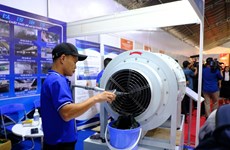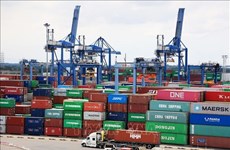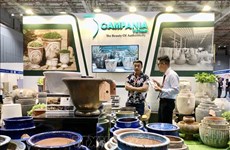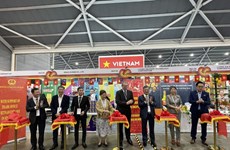Sustainable development key to joining global chain
Sustainable supplies of goods and production were key areas for Vietnamese businesses to focus on in order to join the global supply chain, Director General of the Foreign Trade Association (Amfori) Christian Ewert said at a conference held in Ho Chi Minh City on October 21.
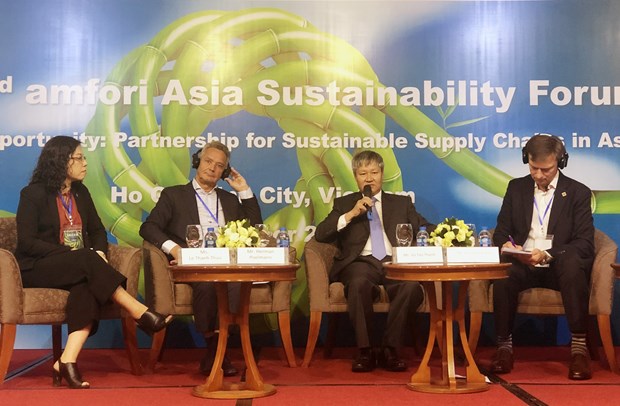 Speakers at the Amfori Asia Sustainability Forum in HCM City on October 21 (Photo: VNA)
Speakers at the Amfori Asia Sustainability Forum in HCM City on October 21 (Photo: VNA)HCM City (VNA) - Sustainable supplies of goods and production were key areas for Vietnamese businesses to focus on in order to join the global supply chain, Director General of the Foreign Trade Association (Amfori) Christian Ewert said at a conference held in Ho Chi Minh City on October 21.
Speaking at the Amfori Asia Sustainability Forum, which gathered about 100 delegates from Asian countries and territories, Ewert said in the context of the rise of Asia, the main products sought in Vietnam were textiles, footwear and fast-moving consumer goods.
Organisations and management agencies in most countries were making efforts to implement the UN's sustainable development goals, and consumers were becoming more concerned about environmental protection and green products, Ewert said.
He said the impacts of climate change from production and business required businesses to become pioneers in sustainable development, focusing on environmental factors. Focus was needed from many countries to find common solutions for sustainable development, especially issues such as climate change, the environment, global supply chains and trade wars.
The global supply chain is posing a series of challenges for businesses, including the origin of goods, trade barriers and trade defence mechanisms. Sustainable development required businesses to form a chain of green product supply and service, and by doing so changing consumer habits.
Vo Tan Thanh, Deputy Director of Vietnam Chamber of Commerce and Industry (VCCI), said there were many global supply chains of goods and services for the European Union and United States located in Asian countries, but the number of Vietnamese enterprises participating in this chain was still very limited.
This shows that Vietnam cannot ignore sustainable development. Vietnamese businesses need to identify this as one of key tools to join the global supply chain, especially when the country has deeply integrated into the international economy. That will provide more opportunities for Vietnamese enterprises to expand their business.
According to statistics from the Ministry of Industry and Trade, most foreign direct investment enterprises (FDI) were affiliated with foreign suppliers, while the majority of Vietnamese private enterprises sold goods and provided services to domestic partners. Only 15 percent of domestic businesses supplied goods and services for foreign partners in Vietnam.
The statistics showed 8.4 percent of businesses directly exported to foreign countries, while 7.4 percent sold indirectly via a third party.
Explaining the situation, some experts pointed out that many Vietnamese enterprises still applied outdated technologies leading to low productivity, and lacked experience in working with foreign enterprises and compliance awareness.
The experts also said that many Vietnamese enterprises had not been proactive or ineligible to participate in the global supply chain, so they could not exploit the benefits of free trade agreements.
At the forum, experts agreed that encouraging and promoting domestic enterprises to meet international standards would help Vietnamese enterprises to join the global supply chain. This would contribute to the implementation of Vietnam's commitment to the UN's sustainable development goals./.









